15 Low-Sugar Foods That Are Actually Unhealthy For You
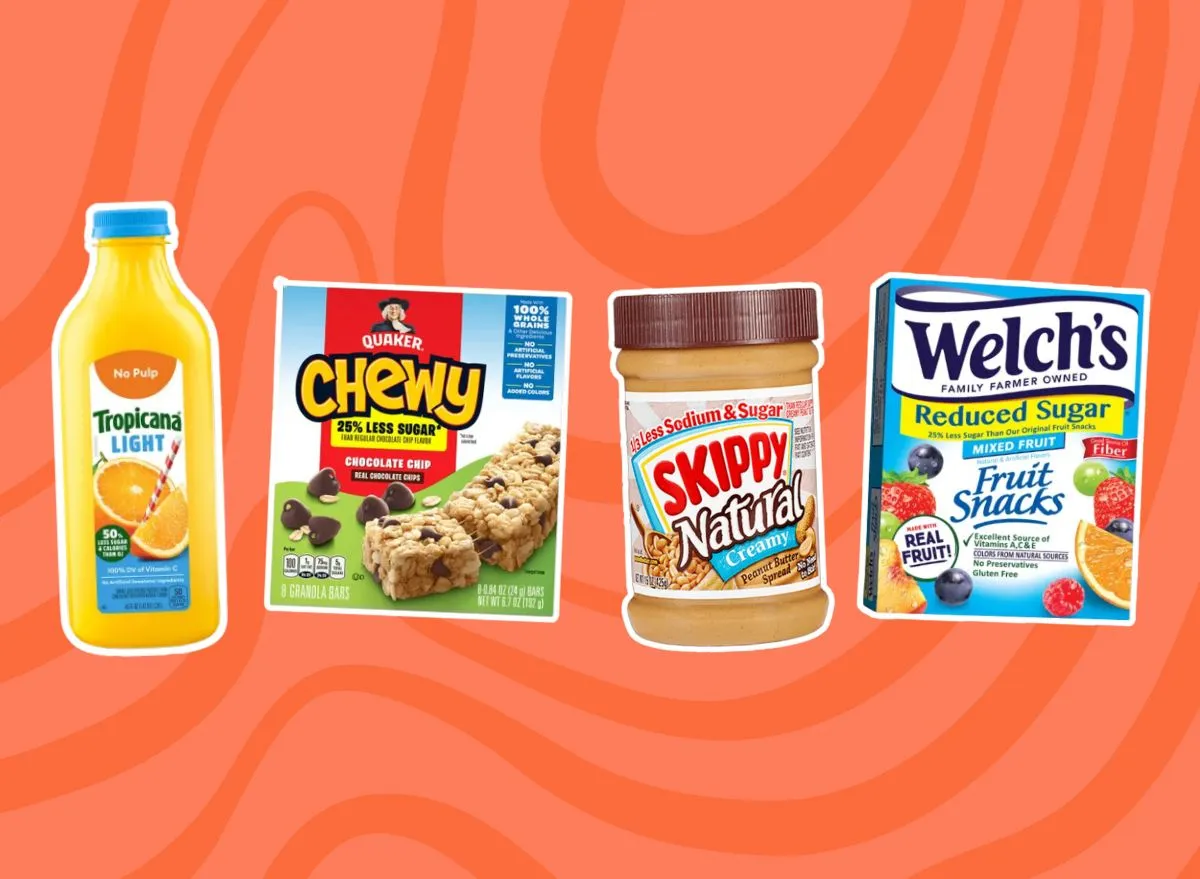
While carbs are the current villain in the weight loss game, we're finally coming around to the fact that it's not all carbohydrates in general, but certain types, like those from added sugar. Mostly found in highly processed foods, added sugar is a simple carbohydrate that provides calories without any nutritional value.
Getting too much added sugar may contribute to health problems like obesity, Type 2 diabetes, and heart disease. The Dietary Guidelines for Americans recommend limiting added sugar intake to no more than 10% of your daily calories , which equals to about 50 grams on a 2,000-calorie diet. So, now the focus isn't only on carbohydrates in food, but added sugar as well.
In your quest to make better food choices, you may look for foods labeled "low-sugar", "reduced sugar", or "sugar-free." While looking at the front label is a good tactic when looking for healthier options, don't stop there. A low-sugar food isn't always the healthier option and may contain added fat or artificial ingredients to improve taste. Turn the package over and take a look at the Nutrition Facts label and ingredient list to make sure the low-sugar food is the better choice and that it's not too high in fat or calories or filled with artificial ingredients and fillers.
To help make grocery shopping a little easier, here's a list of 15 low-sugar foods that may not make the healthiest choice. Read on, then check out 30 Healthy Sugar-Free & Low-Sugar Snacks.
Tropicana Light
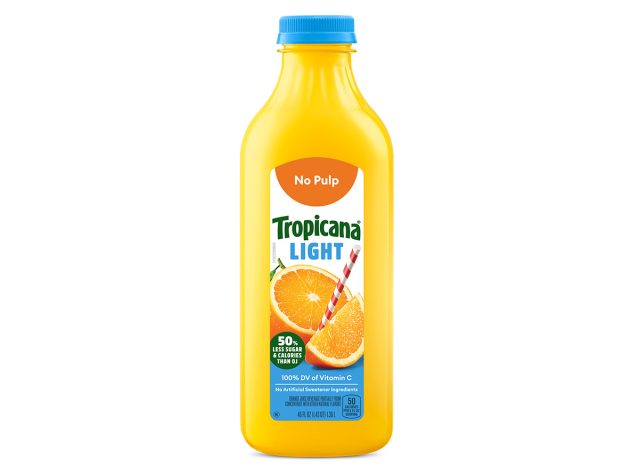
Calories: 50
Fat: 0 g (Saturated fat: 0 g)
Sodium: 5 mg
Carbs: 11 g (Fiber: 0 g, Sugar: 10 g)
Protein: less than 1 g
Since sugary beverages are one of the main sources of added sugar in the American Diet, switching to low-sugar drinks seems like a good way to cut back. If you like orange juice, you may give Tropicana Light No Pulp a try. Orange juice has no added sugar, only the natural sugar from the fruit. You get half the sugar in Tropicana Light compared to Tropicana Original, but the light juice comes with a lot of added ingredients, like water, stevia for sweetness, and gellan gum for bulking and stabilizing juice. Diluting and bulking up the juice reduces its nutritional content, and Tropicana adds vitamin C as ascorbic acid. Both Tropicana juices meet 100% of the daily value for vitamin C, but they all come from oranges in the original juice.
Quaker 25% Less Sugar Chewy Granola Bars
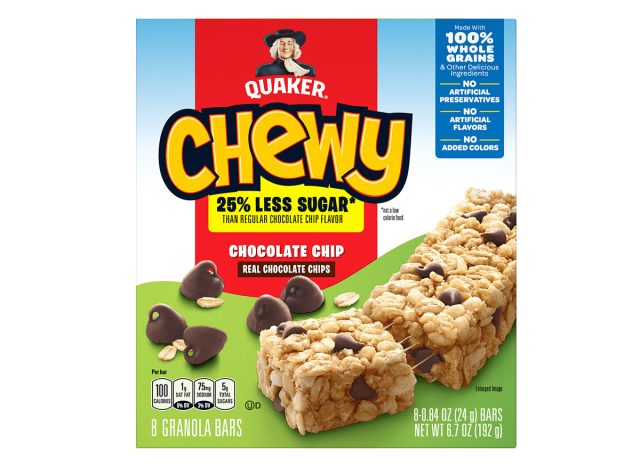
Calories: 100
Fat: 4 g (Saturated fat: 1 g)
Sodium: 75 mg
Carbs: 17 g (Fiber: 3 g, Sugar: 5 g)
Protein: 1 g
Choosing the lower sugar version of a food is one way to reduce added sugar intake, but that doesn't automatically make it a good choice. Quaker's Low-Sugar Chewy Chocolate Chips Granola Bars have a little less added sugar than the original — 5 grams versus 7 grams, but sugar is a main ingredient in the "less sweet" snack, appearing as the second ingredient as brown sugar seven more times as sugar, sugar, corn syrup, sugar (again), corn syrup solids, invert sugar, and molasses. On top of all that sugar, the granola bar also has polydextrose, a synthetic food additive bulking agent that also acts as a low-calorie sweetener. We do like that the bar meets 10% of the daily value for fiber and is low in calories, but cutting out some of the sugar doesn't make this already suspicious "health" food healthy.
Skippy Natural 1/3 Less Sodium & Sugar Peanut Butter Spread
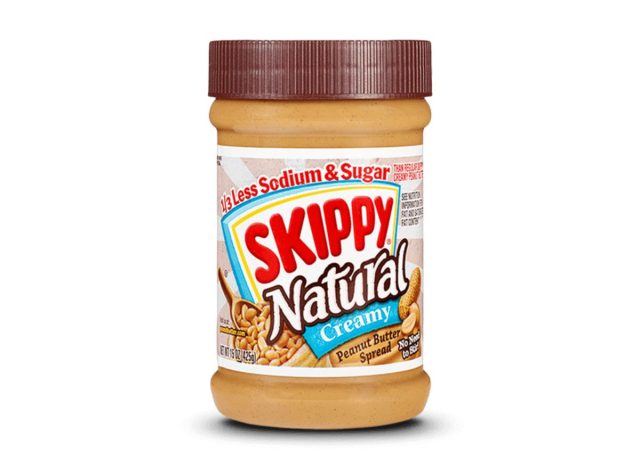
Calories: 210
Fat: 17 g (Saturated fat: 4 g)
Sodium: 100 mg
Carbs: 6 g (Fiber: 2 g, Sugar: 2 g)
Protein: 7 g
Peanut butter is a staple in the kitchen. It's great for making sandwiches, mixing in hot cereal, or making yummy Thai peanut noodles, and a good source of plant protein and healthy fat. A truly natural peanut butter has two ingredients: peanuts and salt. Despite the natural name, SKIPPY Natural 1/3 Less Sodium & Sugar Peanut Butter Spread has four ingredients: roasted peanuts, sugar, palm oil, and salt. It's the added ingredients that make the low-sugar peanut butter a less-than-healthy choice. The added sugar isn't too bad, meeting 4% of the daily value, but not great. It's palm oil that's a little more concerning as a source of saturated fat. Though the jury is still out on whether the saturated fat in tropical oils is a serious health concern, there's some evidence that palm oil leads to higher low-density lipid (LDL) cholesterol levels — the bad cholesterol linked to cardiovascular disease — than vegetable oils.
An alternative PB is MaraNatha's Organic Creamy Peanut Butter, made with just peanuts and salt, containing 15 grams of fat and 2 grams of saturated fat.
Welch's Reduced Sugar Fruit Snacks
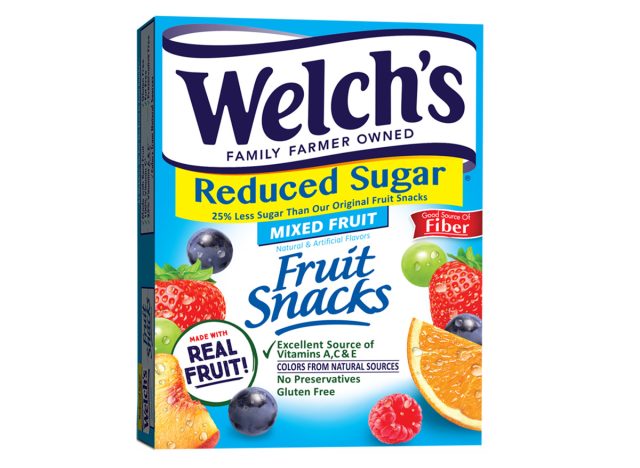
Calories: 60
Fat: 0 g (Saturated fat: 0 g)
Sodium: 5 mg
Carbs: 17 g (Fiber: 3 g, Sugar: 7 g)
Protein: 1 g
Kids love them because they're sweet and fun to eat, and parents love them because they contain real fruit and make an easy lunch box snack. Welch's Reduced-Sugar Fruit Snacks has less sugar than the original, but the chewy snack contains two added sugars — corn syrup and sugar — and meets 10% of the daily value. The low-sugar fruit snacks are a little better than the original, but the fruit puree isn't an equal replacement for real fruit.
Naked Juice Lower Sugar Glorious Greens
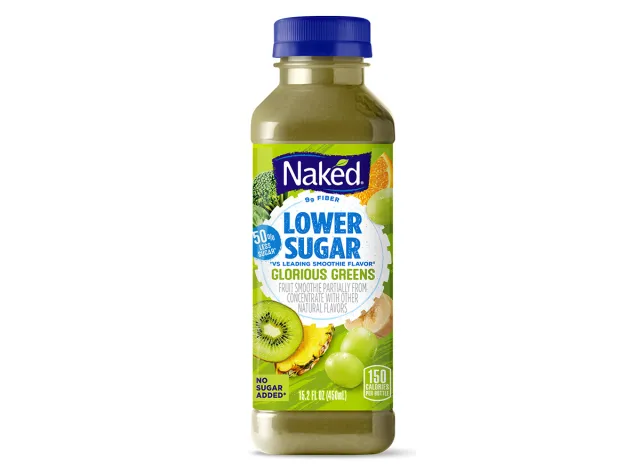
Calories: 150
Fat: 0 g (Saturated Fat: 0 g)
Sodium: 30 mg
Carbs: 39 g (Fiber: 9 g, Sugar: 26 g)
Protein: 2 g
All of the smoothies made by Naked Juice are made without added sugar. While Naked Lower Sugar Glorious Greens has less total sugar than Green Machine—a whopping 53 grams—it's still a concentrated source of sugar at 26 grams in a 15-ounce serving. Sure, some of that sugar comes from fruit, but most is from the white grape juice concentrate, the first ingredient. Naked Juice lowers the sugar content by adding citrus fiber and chicory root fiber, bulking up the smoothie and meeting 32% of your daily needs for fiber. Drinking juice with added fiber may slow absorption, keeping you full longer and preventing spikes in blood sugar. The concern with Naked Juice's low-sugar smoothie is that it looks like you're getting a fruit and veggie-packed smoothie, but it's really white grape juice with added fiber, some fruit puree, and a sprinkling of vegetables.
Dole Gel Fruit Bowls No Sugar Added
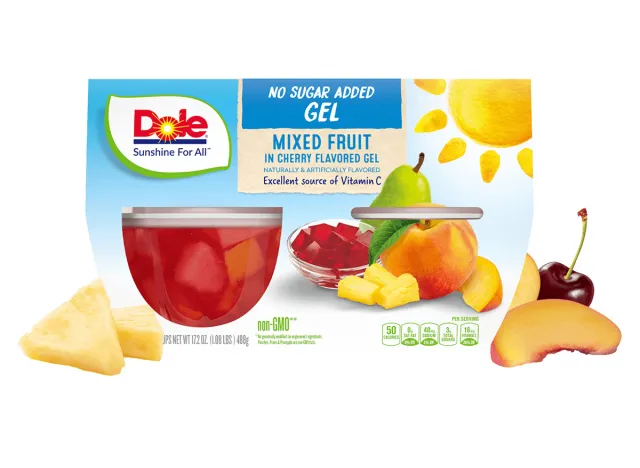
Calories: 50
Fat: 0 g (Saturated fat: 0 g)
Sodium: 40 mg
Carbs: 13 g (Fiber: 1 g, Sugar: 3 g)
Protein: 0 g
No sugar added Dole Gel Fruit Bowls are a low-calorie snack with real fruit. However, the sweetness in the snack comes from nonnutritive sweeteners: maltitol and sucralose. Malitol is a sugar alcohol with a laxative effect that may cause diarrhea if you consume too many of these fruit bowls.
Though generally recognized as safe, there's some evidence linking the intake of artificial sweeteners like sucralose to an increased risk of serious health conditions like coronary heart disease. The no-sugar fruit gel also contains a long list of food additives, including natural and artificial flavors, maltodextrin, and fumaric acid. The gel fruit bowl also uses carrageenan, a gel-forming chemical that preliminary evidence suggests may affect gut health.
Lean Cuisine Balance Bowls Creamy Pasta Primavera
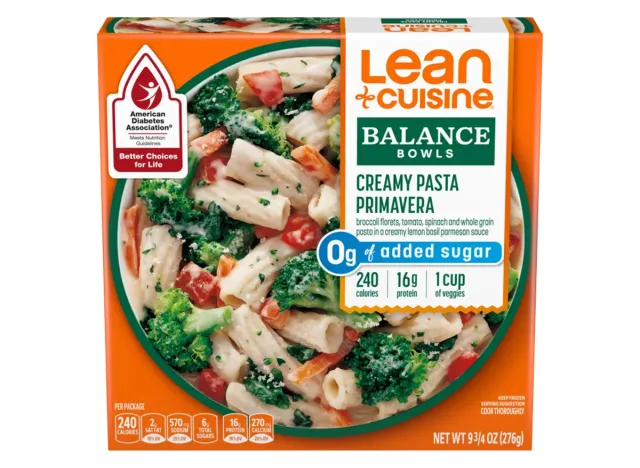
Calories: 240
Fat: 4 g (Saturated fat: 2 g)
Sodium: 570 mg
Carbs: 34 g (Fiber: 6 g, Sugar: 6 g)
Protein: 16 g
Lean Cuisine is making a concerted effort to improve the nutritional quality of its frozen meals. The Balance Bowl line meets the American Diabetes Association (ADA) Better Choices for Life Program aimed at helping busy people make better food choices at the grocery store. Overall, the line of frozen meals is low in calories and fat and a good source of protein and fiber. The Creamy Pasta Primavera bowl meets 21% of the daily value for fiber but also 10% of the daily value for saturated fat. It also has 1 cup of vegetables. But it's high on sodium, meeting 25% of the daily value for sodium, and has a long list of food additives, including carrageenan, maltodextrin, lactic acid, lipolyzed cream, and flavoring. Lean Cuisine Balance Bowls are okay when you're short on time, and they make a better choice than many frozen meals, but they're still processed food.
Blue Bunny Sweet Freedom™ Vanilla Ice Cream
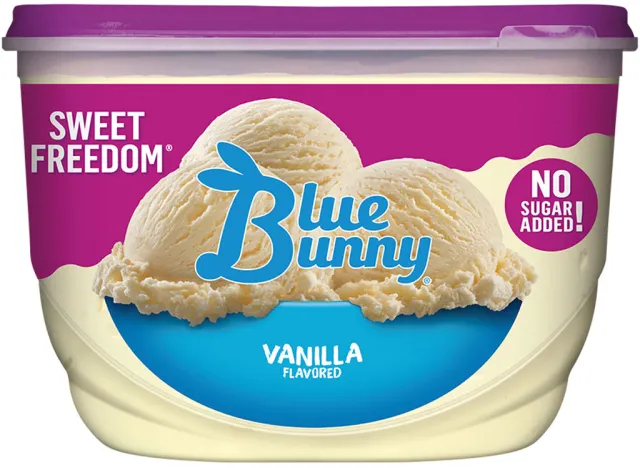
Calories: 110
Fat: 3.5 g (Saturated Fat: 2.5 g)
Sodium: 60 mg
Carbs: 23 g (Fiber: 6 g, Sugar: 6 g)
Protein: 3 g
Guilt-free indulgence. That's what Blue Bunny says about their Sweet Freedom line of no sugar added, reduced fat ice creams Instead, the ice cream is loaded with fillers and artificial ingredients to make up for the lack of sugar and fat. One of the key ingredients is maltitol, a sugar alcohol with a laxative effect that may cause unpleasant side effects, abdominal pain, and diarrhea. Sweet Freedom also has artificial sweeteners, acesulfame potassium, and sucralose, along with maltodextrin, artificial flavors, propylene glycol esters, and carrageenan, just to name a few. This is a low-sugar, ultra-processed ice cream.
Smucker's Uncrustables Reduced Sugar Peanut Butter and Strawberry Sandwich
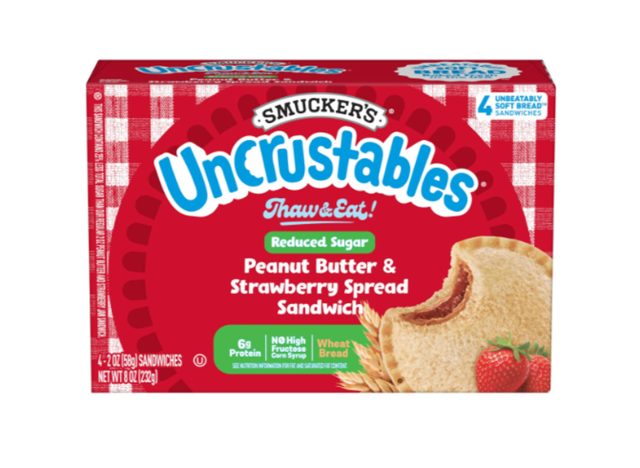
Calories: 190
Fat: 9 g (Saturated Fat: 2 g)
Sodium: 190 mg
Carbs:23 g (Fiber: 3 g, Sugar: 7 g)
Protein: 6 g
Who can resist a delicious PB&J? Smucker's Uncrustables makes it easy to eat the classic sandwich, doing all the work for you. Though convenient, you lose all control over the ingredients and nutrition. Smucker's Uncrustables Reduced Sugar Peanut Butter and Strawberry Sandwich may have less total sugar than the original, 7 grams versus 10 grams, but it still has a long list of ingredients, including peanut butter made with hydrogenated vegetable oils. Hydrogenation is a chemical process that turns liquid fats into hard fats, increasing saturated fat content. It's not known how the saturated fats in hydrogenated oils affect health, but limiting overall saturated fat intake to less than 10% of calories is recommended for better health, or no more than 22 grams of saturated fat on a 2,00-calorie diet.
Twizzlers Zero Sugar
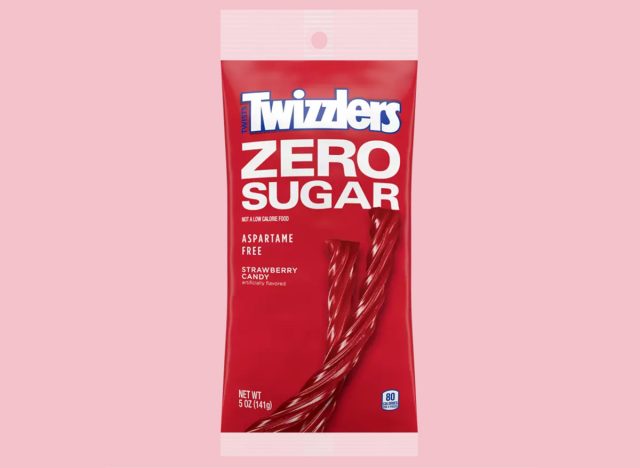
Calories: 80
Fat: 0.5 g (Saturated Fat: 0 g)
Sodium: 70 mg
Carbs: 22 g (Fiber: 0 g, Sugar: 0 g)
Protein: less than 1 g
If you have a super sweet tooth you're trying to curb with treats like Sugar-Free Twizzlers, you may be setting yourself up to fail. You may not pay attention to serving size when eating treats like Twizzlers, especially if they're sugar-free. However, with maltitol as the first ingredient, you may want to pay attention to the four-piece serving size. Eating more than one serving, or the whole bag, may cause stomach upset. It also contains sorbitol, another laxative-causing sugar alcohol, and acesulfame potassium. Beyond the sugar-free sweeteners, no-sugar Twizzlers has palm oil, artificial flavor, and artificial color (Red 40). Though regularly tested and considered safe by the FDA, Red Dye 40 comes with a warning label in Europe that it may have an adverse effect on activity and attention.
Duncan Heinz Keto-Friendly Blueberry Muffin Mix
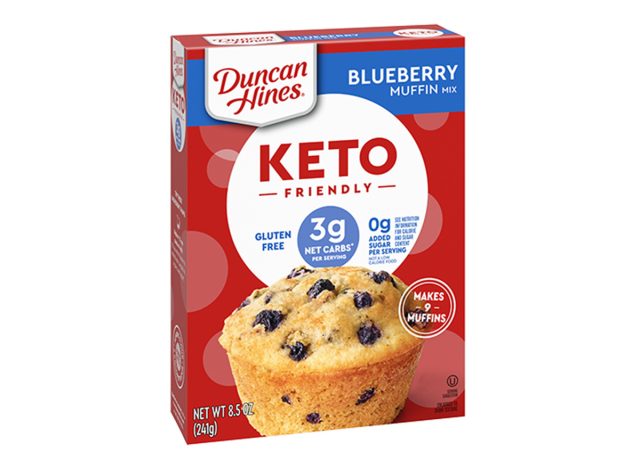
Calories: 120
Fat: 4 g (Saturated fat: 1 g)
Sodium: 95 mg
Carbs: 18 g (Fiber: 5 g, Sugar: 3 g)
Protein: 3 g
Thanks to the popularity of the low-carb diet, many traditional foods have keto-friendly versions, like Duncan Heinz Keto-Friendly Blueberry Muffin Mix. The muffin mix has no added sugar, so the nonnutritive sweeteners erythritol, allulose, and stevia are used instead. The sugar replacements keep carbs low but come with potential side effects. Erythritol is a sugar alcohol that may increase the risk of heart attack or stroke when consumed in large amounts. Allulose is a natural nonnutritive sweetener approved as safe by the FDA but is pending approval by the European Food Safety Authority since it's a novel food. Both erythritol and allulose may also have a laxative effect.
Torani Sugar Free Hazelnut Syrup
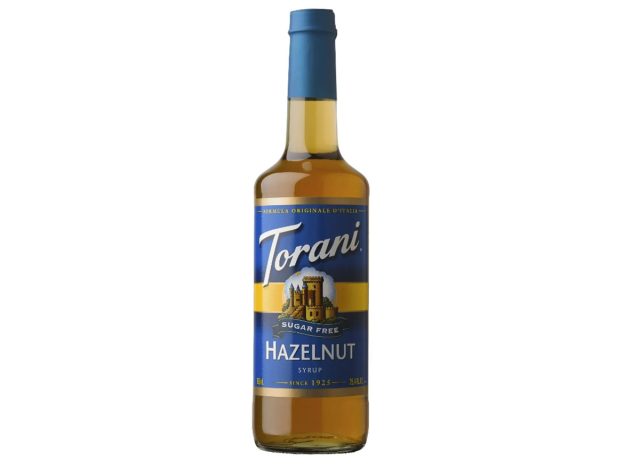
Calories: 0
Fat: 0 g (Saturated fat: 0 g)
Sodium: 5 mg
Carbs: 0 g (Fiber: 0 g, Sugar: 0 g)
Protein: 0 g
Torani Sugar-Free Hazelnut Syrup sweetens your coffee without calories, carbs, or sugar. But the syrup contains artificial sweeteners, acesulfame potassium (Ace-K), and sucralose. The FDA considers both sweeteners safe, but a 2022 cohort study published in PLoS Medicine found an association between intake of artificial sweeteners, especially Ace-K, and increased risk of cancer.
Hunt's No Sugar Added Pasta Sauce
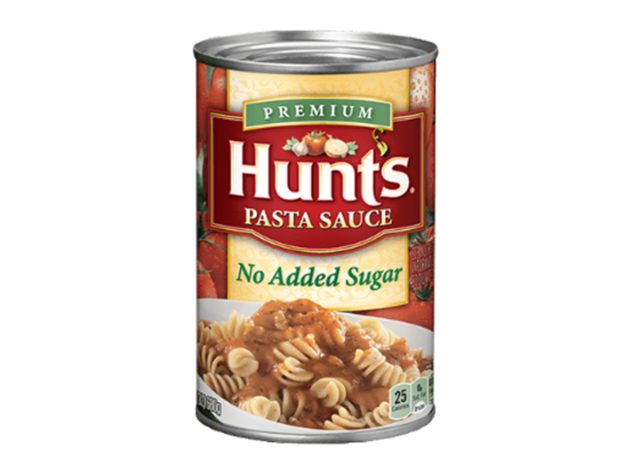
Calories: 30
Fat: 0 g (Saturated fat: 0 g)
Sodium: 460 mg
Carbs: 6 g (Fiber: less than 1 g, Sugar: 3 g)
Protein: Less than 1 g
Sugar is added to tomato sauce to balance flavor, but some brands have a lot of more sugar than others. Hunt's No Sugar Added Tomato Sauce seems like a good alternative, if you're looking for ways to cut back, but it uses artificial sweeteners Ace-K and sucralose as a replacement for sugar.
Atkins Vanilla Macadamia Nut Soft Baked Energy Bar
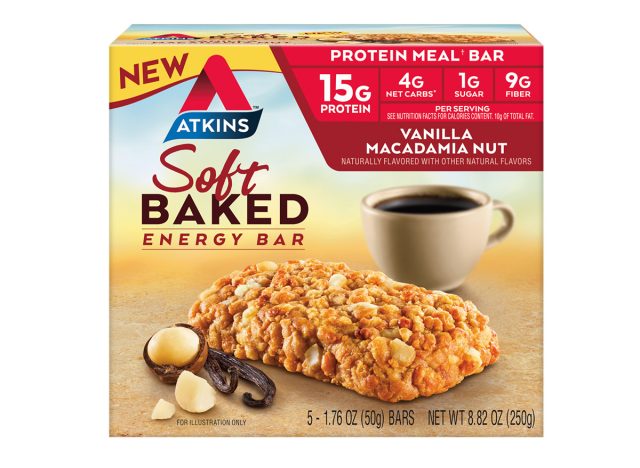
Calories: 190
Fat: 10 g (Saturated fat: 3.5 g)
Sodium: 250 mg
Carbs: 19 g (Fiber: 9 g, Sugar: 1 g)
Protein: 15 g
Atkins Vanilla Macadamia Nut Soft Baked Energy Bar is a convenient meal bar that's high in protein and low in sugar. In a pinch, the energy bar makes a good option if it tops you from hitting the vending machine for a quick bite. The bar is an excellent source of fiber, meeting 32% of the daily value. However, the energy bar is high in fat and saturated fat, meeting 13% and 18% of the daily value, respectively, and contains a long list of ingredients, including soy protein isolate, polydextrose, palm oil, glycerin, and sucralose.
Ray's Honey Mustard Flavored Dipping Sauce
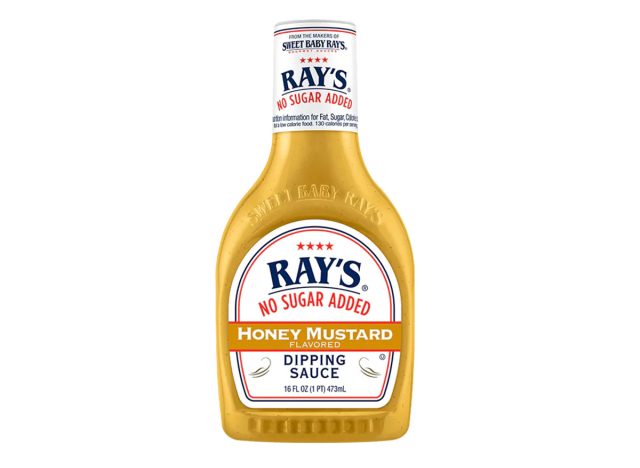
Calories: 130
Fat: 14 g (Saturated fat: 2 g)
Sodium: 240 mg
Carbs: 2 g (Fiber: less than 1 g, Sugar: 0 g)
Protein: 0 g
Condiments like honey mustard sauce are also a source of added sugar. Ray's No Sugar Added offers a number of condiments without sugar, including barbecue sauce, teriyaki marinade, and honey mustard dipping sauce. Ray's Honey Mustard Flavored Dipping Sauce may not have added sugar, but it's loaded with fat. At 14 grams of fat per serving, nearly 100% of the calories in the dipping sauce come from fat. It's also sweetened with allulose and sucralose and has artificial preservatives, including potassium sorbate, sodium benzoate, and calcium disodium EDTA. No added sugar doesn't mean healthy in this case, especially with all the fat and additives.
- Source: https://www.cdc.gov/nutrition/php/data-research/added-sugars.html
- Source: https://www.dietaryguidelines.gov/sites/default/files/2021-03/Dietary_Guidelines_for_Americans-2020-2025.pdf
- Source: https://www.cdc.gov/nutrition/data-statistics/sugar-sweetened-beverages-intake.html
- Source: https://www.sciencedirect.com/topics/agricultural-and-biological-sciences/gellan-gum
- Source: https://www.sciencedirect.com/topics/agricultural-and-biological-sciences/polydextrose
- Source: https://jn.nutrition.org/article/S0022-3166(22)08795-8/fulltext
- Source: https://www.ncbi.nlm.nih.gov/pmc/articles/PMC6950290/
- Source: https://pubchem.ncbi.nlm.nih.gov/compound/Maltitol
- Source: https://www.ncbi.nlm.nih.gov/pmc/articles/PMC10822749/
- Source: https://www.mdpi.com/2072-6643/16/9/1367
- Source: https://diabetes.org/health-wellness/better-choices-for-life
- Source: https://www.ncbi.nlm.nih.gov/pmc/articles/PMC10260459/
- Source: https://www.ncbi.nlm.nih.gov/pmc/articles/PMC5497165/
- Source: https://medlineplus.gov/ency/patientinstructions/000838.htm
- Source: https://www.ncbi.nlm.nih.gov/pmc/articles/PMC6693595/
- Source: https://www.fda.gov/consumers/consumer-updates/how-safe-are-color-additives
- Source: https://europa.eu/youreurope/business/product-requirements/food-labelling/additives/index_en.htm#consumers
- Source: https://www.nih.gov/news-events/nih-research-matters/erythritol-cardiovascular-events
- Source: https://www.ncbi.nlm.nih.gov/pmc/articles/PMC9414979/
- Source: https://www.fda.gov/food/food-additives-petitions/aspartame-and-other-sweeteners-food
- Source: https://www.ncbi.nlm.nih.gov/pmc/articles/PMC8946744/









